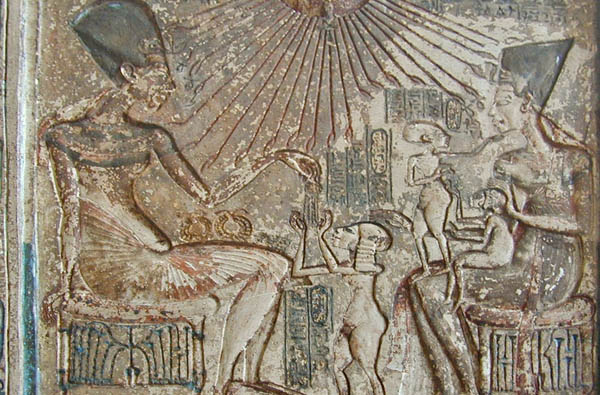Pharaoh Akhenaten
Pharaoh Amenhotep IV was one of the most puzzling pharaohs of Egypt, also mentioned as the ‘Heretic Pharaoh’ or ‘Rebel Pharaoh’. His father wasAmenhotep III, the King of the 18th dynasty when Egypt was at its peak. His mother wasTiyi. What was unique about her was the she was not a Royal, as it was rare for kings not to marry royalty.
Amenhotep IV was different from previous pharaohs in that he was revolutionary, intellectual, and liked philosophy. Because of his position as pharaoh, he had the power to make changes, and so he did—by completely reforming the Egyptian religions. He tried to change the faith fromAmun RA to the one ‘true’ god ofAten (the Sun disc), therefore creating the first monotheistic religion. He then changed his name to Akhenaten, which means ‘the glory of Aten’. Akhenaten built Akhetaton, known today asAmarna, to honour the god Aten. The city was extraordinary, with huge buildings and temples, palaces and gardens, and was used as the centre of attacking the old Egyptian religion and its followers—something that made many angry.
Obviously his revolutionary actions weren’t taken easily by the priesthood and the Egyptians followers of Ra. It was difficult for such a traditional culture to reject their old gods, and the priesthood—which held a great deal of power—would not allow something like this. As a result, Akhenaten’s actions faced resistance, and it wasn’t very long before his son, Tutankhamen, restored the old religion, disregarding his father’s actions.
Akhenaten marriedNefertiti, an Egyptian whose parentage is unknown, as well as her birthdate and the date of her death. Both Nefertiti and Akhenaton are portrayed with prolonged skulls, and depictions of Akhenaton exhibit femalecharacteristics. Many theories exist related to their skulls, ranging from conformity, to artificial methods of prolonging them, to the possibility that they havealien origins; however none of this is proven.
All physical traces of them have disappeared, and nothing is known about their death. Akhenaten is the only pharaoh of the 18th Dynasty whose mummy has not been found, and after their deaths and disappearances—Nefertiti earlier than Akhenaten—they were never mentioned again in any historical records. Theirtombs were discovered in the 1890’s, but they wereempty. It was as if they were never used. It can only be assumed that after their disappearance, everything was destroyed and the monotheistic religion was lost…or was it?
Other controversial aspects regarding Akhenaten and Nefertiti puzzle archaeologists, the most important one being the connection betweenAkhenaten to Moses. According to the Ptolemaic Egyptian historian and High Priest of HeliopolisManetho, who wrote the History of Egypt (Aegyptiaca), at about the third century BC, there are references of Moses and Akhenaten living during the same period—something that goes against Christian and Jewish beliefs. Manetho recorded details about Moses and the Exodus, placing the event precisely during the period of Akhenaten’s reign. Not only that, but he states that Moses (whose name was Osarseph after the god Osiris) received much of his education under Akhenaten and helped to establish the new monotheistic religion of Aten.
Based on Manetho’s description, and taking into account how Akhenaten disappeared, there are a few that believe that Moses wasAkhenaten.
Akhenaten was someone who went against all the deeply held traditions of Egypt and tried to establish a new religion. Both he and his wife had unusual physical characteristics, and both disappeared from history. All of this evidence has led many to assume that Akhenaten and Nefertiti weren’t ordinary people, maybenot even ordinary humans. Perhaps they were extra-terrestrial, or were connected to a singular ‘real god’ who commanded them to create a religion around him that Moses later took away from Egypt and began promoting on his own. These are all logical conclusions based on what is presented, however nothing is certain and questions are yet to be answered.
By John Black
Related Links
Akhenaten - The Glory of the Aten
The Mystery of Nefertiti (Nofretete) Solved
Moses: Religious Controversy and the Egyptian 18th Dynasty
Related Books
 |
 |
Related Videos


















Comments
This is one of my fav egyptian pharaohs!!! i know they can't prove he's an alien but y'know he's totally an alien! :D
love, light and blessings
AB